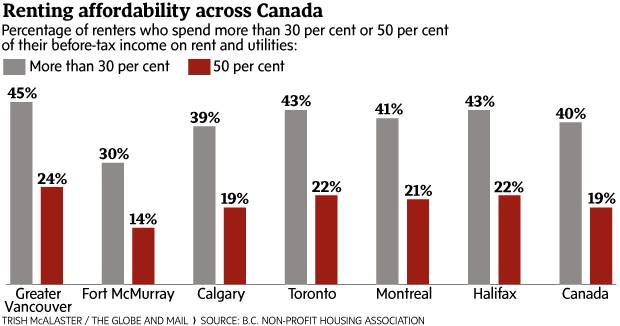
Affordable rental housing crisis threatening B.C. economy: study
TheGlobeAndMail.com
Nov. 23, 2015
Mark Hume
The lack of affordable rental housing in British Columbia has reached such a crisis point it is threatening to damage the economy, a new study indicates.
Tony Roy, CEO of the BC Non-Profit Housing Association, said data gathered in the most comprehensive study of rental housing ever done in the province show that nearly half of all renters are pouring more than 30 per cent of their income into rent. And 24 per cent in Metro Vancouver are spending more than half their income on rent, leaving them with little disposable income.
“And our figures are gross incomes,” said Mr. Roy. “So if you are spending 30 per cent to 40 per cent on taxes and another 50 per cent on rent it doesn’t leave much to do anything in the economy. All you can do is keep a roof over your head and then visit the food bank a few times a month to try and make it through. And that’s what’s happening.”
Combined with a vacancy rate of less than 1 per cent, that means businesses are increasingly finding it hard to hire new workers because many people simply can’t afford to live in B.C., particularly in Metro Vancouver, Mr. Roy said.
“I think our whole economy is suffering because we haven’t made investments [in affordable housing] in the past 20 or 30 years,” he said. “I don’t understand why this isn’t [government’s] number one priority. It’s extremely difficult for our economy to grow when people who want to work here have no place to live.”
Mr. Roy said the rental housing index study gathered data nationally, looking not just at rental rates and vacancy levels but at other data, including income levels, the type of work renters do and the degree to which crowding in rental units is occurring.
The group’s data show the issue of rental affordability extends far beyond B.C.’s Lower Mainland. Statistics from other major cities such as Toronto and Montreal show a similar proportion of renters who spend more than 30 per cent of their income on basic living expenses. Across the country, 40 per cent of renters spend more than 30 per cent of pre-tax income on rent and utilities, with 19 per cent spending more than half their income.
“It’s not just students and people working in retail. It’s people in construction, in government jobs. A lot of health-care workers are renters. So a lot of the people you interact with in your everyday life are renters,” he said. “That means any private company that’s trying to grow or expand or come to British Columbia or do anything won’t be able to recruit workers here because they can’t afford to live here and there’s no affordable housing available to them.”
The study shows there are about 304,000 renter households in the Metro Vancouver area, or about 34 per cent of all households, and the average renter household income is about $54,000.
The average monthly rent (plus utilities) in Vancouver is $1,054 which is about $200 higher than the national average.
Mr. Roy said the hardest hit demographic group is single mothers, with 75 per cent spending 30 per cent of their gross income on rent and with about 30 per cent reporting raising children in overcrowded conditions.
“There were a number of things in this study that really stood out, but first among them is … how big the problem is for single mothers,” he said. “I think there was a general sense that single mothers were in a bad position, but what we didn’t realize is that throughout the suburbs of Vancouver they were disproportionately the worst-off group of any in the province.”
Mr. Roy said that with relatively lower incomes and fixed costs because of the children they are caring for, single mothers have little money left after paying rent.
“Things were the absolute worst in the proportion single moms were spending on their income on rent,” he said. “It was so high it explains why food bank usage is through the roof.”
Mr. Roy also noted other surprises in the study were the high rents seniors face in Kelowna ($400 per month more on average than seniors in other regions) and the relatively high rents in the northeast resource sector, where the average monthly rent is $773. In the northeast, 43 per cent of renters spend more than 30 per cent of their income on rent.
He also said the new Liberal government in Ottawa has promised to address housing issues and the B.C. government has already taken some steps in transferring land to non-profits for housing development.
“I think help is coming but it takes a long time to build buildings and move people in … so things are going to get worse before they get better,” he said. “I think the next five years is going to be tough but I hope by then the work that various levels of government are doing will start to show impact.”

